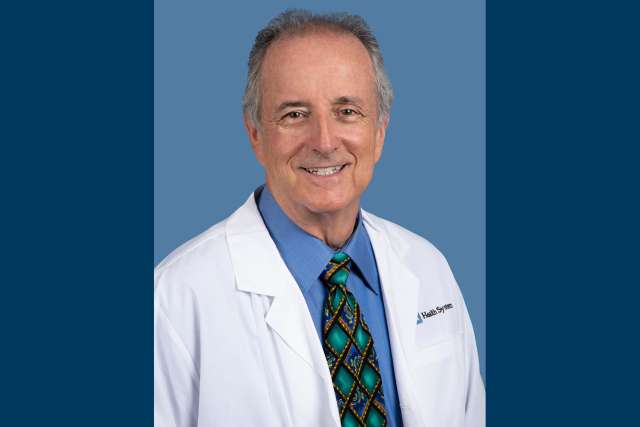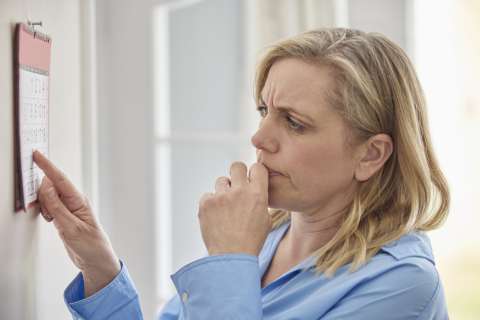After 43 years of private practice at a large medical group, Robert Reiss, MD, considered retirement.
“I thought, maybe I’m done,” he says of the time he spent mainly working on government contracts. “It’s just not fun anymore.”
Then the internal medicine physician got an offer from UCLA Health to practice in a small clinic in the South Bay.
Dr. Reiss started seeing patients at UCLA Health’s Palos Verdes Primary & Specialty Care clinic in January of 2023 “and right from the get-go, I’ve been loving it,” he says.
(This despite having earned his undergraduate and medical degrees at crosstown rival USC, he says with a wink.)
Working in the clinic in Rolling Hills Estates reconnects him with everything he loves about being a physician, he says. He can spend meaningful time with patients — many of whom followed him from his previous practice — and see the impact he has on their well-being. These trusting relationships lead to better health outcomes for patients and more satisfaction for practitioners.
The schedule also leaves plenty of time for volunteer work. Dr. Reiss is active with the Crohn’s and Colitis Foundation and does tattoo removal every week for former gang members through Homeboy Industries.
“I don’t think I’ve been this happy in my entire life,” he says.
Dr. Reiss didn’t grow up dreaming of a career in medicine. The first in his family to go to college, he wasn’t sure what to study when he got to USC. He dabbled in math and business classes — inspired by his father, who ran a successful doughnut business — but neither subject clicked. Then a physics course for pre-med students lit him up, and a conversation with a friend’s doctor-dad sealed the deal.
“He said, ‘Medicine is the best,’” Dr. Reiss recalls. “‘It’s constantly changing. It’s like a microcosm of the world. You meet patients from all different types of situations. It’s the most rewarding career possible.’ And he sold me on it.”
Being of service
Helping others is an important part of Dr. Reiss’ life. He’s been active with the Crohn’s and Colitis Foundation for decades, receiving its 2022 Impact Award for his contributions.
He got involved with the organization after his eldest son was diagnosed with Crohn’s disease, an inflammatory disease of the intestine, in 1994. Seven years later, his daughter was also diagnosed with the condition.
Both are healthy now, he says. But Dr. Reiss still makes himself available to chat with any parent whose child is diagnosed with Crohn’s. He speaks to them not as a doctor, but as a fellow parent navigating treatment for their child.
Since 2019, Dr. Reiss has also volunteered with Homeboy Industries, a gang rehabilitation program founded by the Rev. Gregory Boyle. Dr. Reiss says he had long been interested in learning tattoo removal, “because I knew that someday these people that are getting all these tattoos were going to say, ‘Oh God, what was I thinking?’”
But he really got serious about the pursuit after seeing Boyle onstage at the Distinguished Speaker Series, a series of lectures from thought leaders presented throughout the Los Angeles area. Boyle said that if there were any doctors in the audience, he could use their help with removing gang tattoos.
“He said, ‘If you come down here, we will train you. And we want you,’” Dr. Reiss recalls. “I looked at my wife, she looked at me, and the die was cast.”
A legacy of connection
Except for a few months during the COVID-19 pandemic, Dr. Reiss has spent every Tuesday at Homeboy headquarters in downtown Los Angeles. His face lights up as he talks about the people he’s met there — a woman who had her first child as a child, herself, after being trafficked by her mother; a 70-year-old man who’d spent 40 years in prison; a middle-aged man who was 18 when he was sentenced to 30 years.
“Down there, I’m seeing felons, people with tattoos like you wouldn’t believe,” he said. “I keep track of them and two days before their appointment, I text them and say, ‘You’re coming to see me on Tuesday.’”
Dr. Reiss credits his father for having taught him the most important skill in health care: relating to human beings from all walks of life.
“I learned more about being a doctor from my dad than from any of my professors,” Dr. Reiss says, “because he really knew how to talk to people.”
In an echo of that legacy, a few of Dr. Reiss’s Homeboy patients sent him Father’s Day cards last year, he says.
“At this point in my career, I’m working more for the thank-you notes than the checks,” he says. “I love being a doctor.”



